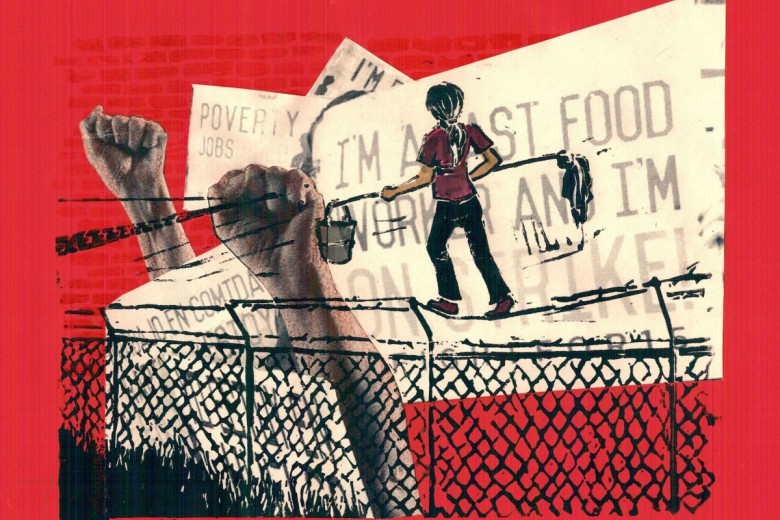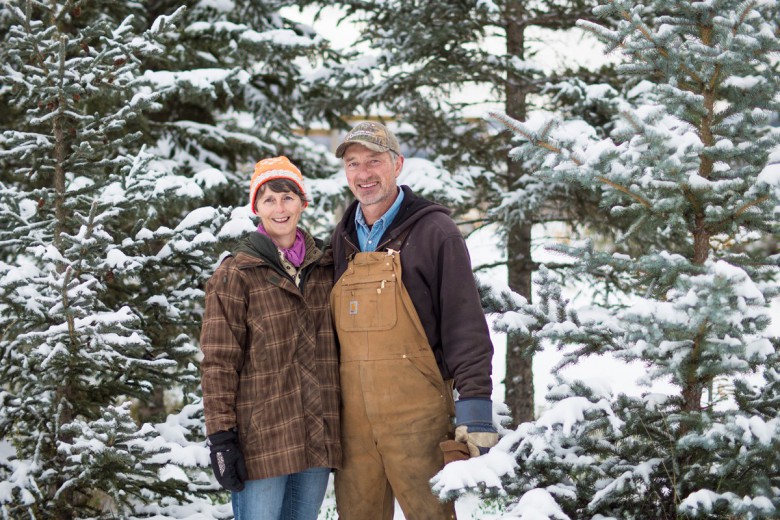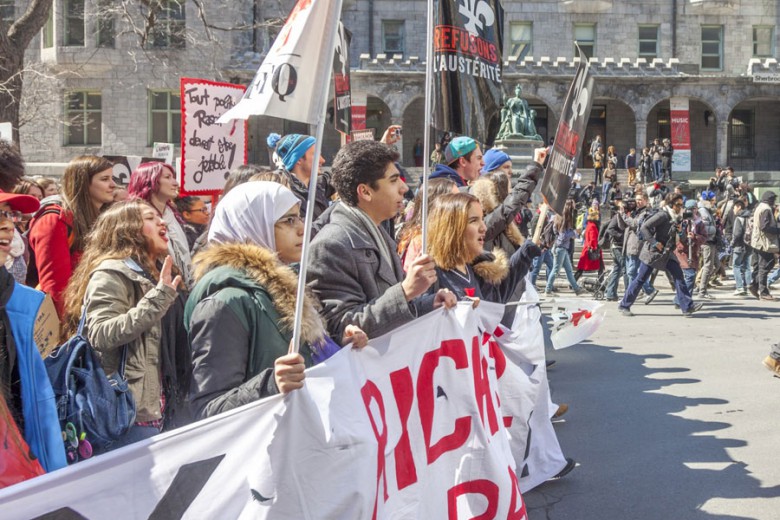
Marilyn Waring’s decades-long career has been as varied as it has been influential. She was the youngest woman elected to the New Zealand Parliament, is a long-time activist for lesbian and gay rights, and has tended her own goat farm for many years. In the wake of the global financial crisis, the revered feminist economist’s perspective on the changing relations between the Global North and South and the changing face of feminism are particularly salient.
Waring’s groundbreaking 1988 book, Counting for Nothing: What Men Value and What Women are Worth, is among the most authoritative books for advocates of women’s economic rights around the world. Her most recent collection, 1 Way 2 C the World: Writings 1984-2006, is a compilation of essays from her years traveling and working in Canada, South America, Africa and Asia.
Waring recently spoke with Briarpatch about the state of women’s rights in the Global South and how women in the North can support southern resistance to economic inequality.
Briarpatch: How have indigenous women’s movements around the world been responding to the global economic crisis?
Marilyn Waring: Indigenous populations around the world are under huge pressure from developers. In many places their collectively owned land has been sold out from under them and exploited, largely by multinationals and sometimes by government-to-government agreements, more recently in partnerships between China and various countries in the Global South.
Take forestry rights, for example. When you move into a forest in an indigenous area, you are not just removing building and construction materials, you are also completely ruining the chemist’s shop and removing a great deal of subsistence food, whether it’s mushrooms or honey or berries or a whole range of other things. You destroy whole livelihoods — the whole basis for well-being of large populations of people goes under when mining or timber consortia move in. All of this has gotten worse. When you enter a recession, the poor get poorer.
The economic crisis hasn’t diverted indigenous women from their key strategies around land tenure, however.
You’ve written a great deal about the rights of unpaid women workers — women whose primary responsibility is the care of family members and the maintenance of the household. How has the gender disparity in unpaid work changed — both in the Global North and South — since you wrote Counting for Nothing in 1988?
The work that I am engaged in with the Commonwealth Secretariat, developing tools for doing a gender-sensitive budget analysis, is going to be really challenging for a lot of countries to cope with when we really expose the full-on exploitation of women’s work by the State.
You can’t make sweeping statements about unpaid work in the Global South anymore. In Central and South America, where the predominance of national statisticians, especially in leadership positions, have been women, there is certainly a major move to start to make women’s subsistence work visible.
In at least one program, the Stephen Lewis Foundation is paying caregivers of HIV patients. It’s a real breakthrough; it’s a first. It’s happening simply because the women applied for it.
French President Nicolas Sarkozy commissioned a report by Joseph Stiglitz, Amartya Sen and other prominent economists that called for the recognition of subsistence work and new indicators of well-being in place of growth. Many people called me and said, “˜Marilyn, they got there 25 years after you!’ Sometimes it takes a very long time, or it takes something like a global recession.
Newspapers keep saying that we’re coming out of the recession. Well, nobody’s going to come out of recession for 20 years because we’re all going to be paying for all of their make-work economic investment schemes, which overwhelmingly were for infrastructure. As I say to my friends, “˜Look how many women are employed in that!’ Where’s the investment in the infrastructure of hearts and minds, which is probably the most important investment a country can make? Meanwhile, the recession means an increase in the care and household work done by women as household budgets adjust to accommodate the recession.
In 1 Way 2 C the World, you detail a number of problems in specific countries in the Global South where abortion is illegal or severely restricted. What kinds of economic consequences do abortion constraints present for women in these countries?
In many parts of the world, women without access to reproductive rights are anemic, are malnourished and are in no physical condition to bear a child or to care for it. Their own provision of breast milk is usually inhibited or unavailable. The large families that occur when contraception is not available in any form means that women’s capacity to engage in paid, informal or subsistence activities is hugely compromised.
You’ve written about some of the ways militarism originating in the Global North has an enormous impact on women’s sexual freedom and safety — primarily the lack thereof.
In the last decade, we’ve seen that we aren’t just dealing with Western militaristic engagement. We can look at countries like Burundi, the Congo, Uganda and many parts of Eastern Europe where civil wars, border disputes and invasions have used women’s bodies as weapons of the war. While the warmongers boast of increasing strategic accuracy of weapons — which supposedly only take out military targets — the outcome is in fact growing numbers of civilian deaths, largely women and children.
Now it is understood that rape of women is a weapon of war and a war crime. Almost anywhere where we have tribunals following military engagement, we have mothers and daughters who have seen their siblings and parents raped, treated shockingly and sometimes killed. The difference now — it is hardly something to be celebrated, but it is worth noting“”is that women are stepping forward. Women are having the courage to appear as witnesses. The crime is recognized. There is enormous advocacy around the world for recognition of forced or coerced prostitution as a war crime. It is no longer hidden under the table. We no longer pretend it doesn’t happen.
At the same time, of course, we all now know — from Iraq in particular and from the scenes at Abu Ghraib — that men and women in military units use sexual humiliation of men and various forms of sexual torture of men in their warmongering as well.
What are some of the ways feminists in the Global North can support women’s efforts in the Global South?
I think the most important thing is to treat the women of the Global South as experts in respect to their own lives. Instead of presuming that we know how to help them, we should ask them what the most important investment that we could make might be. The answers can vary enormously. When we asked that question of South African women under the apartheid system, they said, “Boycott. Even though it hurts us, boycott.” It’s not for us to be constantly determining the priorities.
A lot of it is a test for us. When it comes to the question of prostitution, personally, I’m an abolitionist. But if women in the Global South say to me, “Marilyn, we need you on the front lines fighting for the rights of sex workers” that’s what I’ll do.
Too frequently, our assumptions are shallow and ill-considered. I think of the women from the North lobbying the invading states in Iraq to get a commitment to a proportion of women’s seats in the Iraqi Parliament in the new constitution. Meanwhile, Iraqi feminists were desperate to stop any constitution that was not secular. Ignoring that issue was a tragic presumption from the women of the North.
I was just in Jordan and Lebanon. There, the message was, “We don’t want your sympathy, we want your solidarity.” So I had to work with how that translates and what it means. It means getting rid of paternal (or maternal) approaches to politics. It means asking myself some really hard questions. It means committing to “do something.” About 48 hours later, I was asked by a major New Zealand magazine for an idea that would change the world. Obviously, they wanted me to write about a restructured GDP or something. So I wrote about a free and independent Palestine and peace in the Middle East. That’s what I’d just been challenged with, and I was glad to have somewhere to put it.
I think that’s what our responsibility is. At the same time, I left Jordan with a seriously large number of pieces of needlework and fabric work by rural women in the typical income-generating situation, because that’s also what I could do.
There’s no one answer. But the important thing is not that we’re finding the answer we want, but that we’re asking the questions of the experts — the women of the South — and listening to their answers.





_780_520_90_s_c1.jpg)
